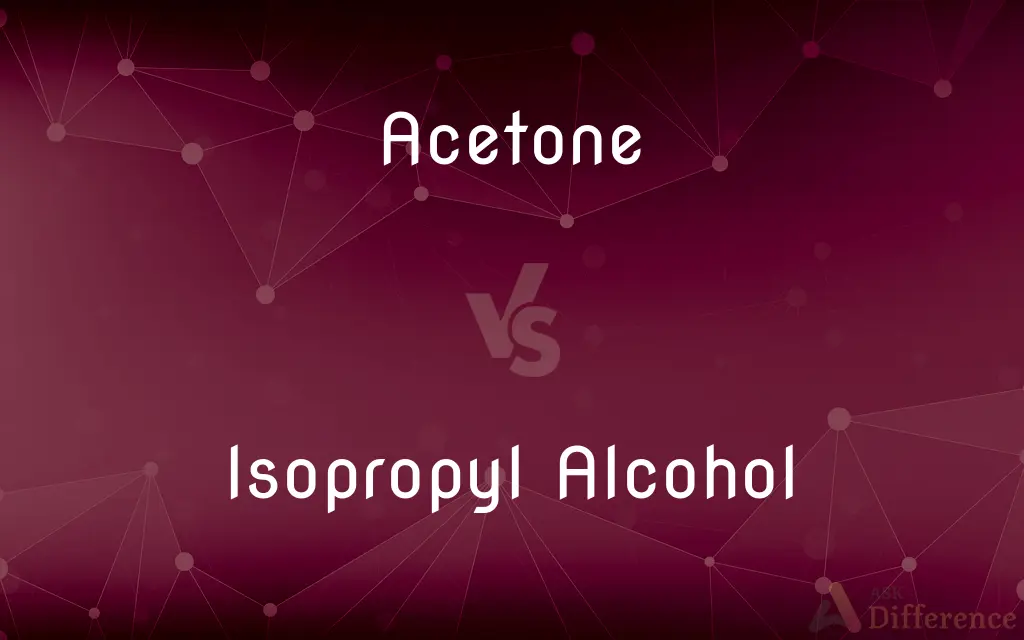Acetone vs. Isopropyl Alcohol — What's the Difference?
By Tayyaba Rehman & Fiza Rafique — Published on March 31, 2024
Acetone is a potent, fast-evaporating solvent used in nail polish remover, while isopropyl alcohol is a less aggressive disinfectant used in rubbing alcohol.

Difference Between Acetone and Isopropyl Alcohol
Table of Contents
ADVERTISEMENT
Key Differences
Acetone, known for its efficiency in removing nail polish, is characterized by its strong solvent properties. It dissolves a wide range of plastics and synthetic fibers. Isopropyl alcohol, on the other hand, is widely used as a disinfectant and cleaner, highlighting its importance in medical and household settings for sanitizing surfaces and skin.
Acetone evaporates much faster than isopropyl alcohol, which makes it a preferred choice in applications requiring quick drying, such as in the cosmetics industry. Isopropyl alcohol, while also evaporating relatively quickly, is often used where a slower evaporation rate is beneficial, like in the application of certain medical disinfectants and cleaners.
The aggressive nature of acetone can make it damaging to certain materials, including some plastics and paints, limiting its use in certain applications. Isopropyl alcohol is milder and less likely to damage surfaces, making it safer for a wider range of materials.
In terms of safety, acetone is more flammable and poses higher risks in terms of inhalation and skin contact, necessitating greater caution in its use. Isopropyl alcohol, while still flammable, is generally considered safer for regular use in well-ventilated areas or with proper protective equipment.
Both substances are used in the laboratory setting for cleaning and preparing surfaces, but acetone's ability to dissolve organic compounds quickly makes it especially valuable for cleaning lab equipment. Isopropyl alcohol is preferred for sterilizing instruments since it is less harsh and can be used on a broader range of materials.
ADVERTISEMENT
Comparison Chart
Primary Use
Nail polish remover, solvent
Disinfectant, cleaner
Evaporation Rate
Fast
Moderately fast
Material Compatibility
Limited, damages some plastics/paints
Safer for more materials
Safety
More flammable, higher inhalation risk
Less flammable, safer for regular use
Application in Labs
Cleaning equipment, dissolving organics
Sterilizing instruments, cleaning
Compare with Definitions
Acetone
A strong, fast-evaporating solvent used in the beauty industry.
Acetone can quickly remove even the toughest nail polish.
Isopropyl Alcohol
A disinfectant commonly used in medical settings and households.
Isopropyl alcohol is applied to the skin before an injection.
Acetone
Used industrially to dissolve plastics and synthetic fibers.
Acetone dissolved the plastic residue left on the machine.
Isopropyl Alcohol
Less aggressive solvent than acetone, safer for various materials.
Isopropyl alcohol cleaned the electronic components without damage.
Acetone
Highly flammable liquid requiring caution during use.
Store acetone in a cool, well-ventilated area away from flames.
Isopropyl Alcohol
Moderately fast evaporation rate makes it useful in cleaning processes.
Isopropyl alcohol quickly dried after cleaning the surface.
Acetone
Utilized for cleaning laboratory equipment due to its solvent properties.
Acetone efficiently cleaned the residue from the glassware.
Isopropyl Alcohol
Used to create antiseptic wipes and hand sanitizers.
Isopropyl alcohol is the main ingredient in many hand sanitizers.
Acetone
Can cause irritation upon prolonged skin contact or inhalation.
Use gloves when handling acetone to avoid skin irritation.
Isopropyl Alcohol
Effective in killing bacteria and viruses on surfaces.
Isopropyl alcohol was used to sanitize the countertops.
Acetone
A colorless, volatile, extremely flammable liquid ketone, C3H6O, widely used as an organic solvent. It is one of the ketone bodies that accumulate in the blood and urine when fat is being metabolized.
Acetone
(organic compound) A colourless, volatile, flammable liquid ketone, (CH3)2CO, used as a solvent.
Acetone
A volatile liquid consisting of three parts of carbon, six of hydrogen, and one of oxygen; pyroacetic spirit, - obtained by the distillation of certain acetates, or by the destructive distillation of citric acid, starch, sugar, or gum, with quicklime.
Acetone
The simplest ketone; a highly inflammable liquid widely used as an organic solvent and as material for making plastics
Common Curiosities
Can acetone and isopropyl alcohol be used interchangeably?
They should not be used interchangeably due to differences in strength, evaporation rate, and material compatibility.
What is the main difference between acetone and isopropyl alcohol?
Acetone is a stronger solvent, making it more effective but also more hazardous than isopropyl alcohol, which is used primarily as a disinfectant.
Which is safer for cleaning electronic components?
Isopropyl alcohol is safer and preferred for cleaning electronic components due to its less aggressive nature.
Can either be used as a hand sanitizer?
Isopropyl alcohol is suitable for use in hand sanitizers, while acetone is not recommended due to its harshness and drying effect on the skin.
Which evaporates faster?
Acetone evaporates faster than isopropyl alcohol.
Can either substance be used to sanitize surfaces?
Isopropyl alcohol is preferred for sanitizing surfaces due to its effectiveness and safety profile.
Is acetone more flammable than isopropyl alcohol?
Yes, acetone is more flammable and poses a higher risk of fire.
Should I use acetone on painted surfaces?
Acetone can damage painted surfaces and should be used with caution or avoided.
Can isopropyl alcohol remove adhesives like acetone?
Isopropyl alcohol can remove some adhesives but is generally less effective than acetone in this regard.
Is acetone or isopropyl alcohol better for removing nail polish?
Acetone is more effective at removing nail polish due to its strong solvent properties.
Is isopropyl alcohol effective against viruses?
Yes, isopropyl alcohol is effective in killing many viruses on surfaces.
Are both substances used in medical settings?
Isopropyl alcohol is commonly used in medical settings for disinfection, whereas acetone is not typically used in such settings.
Is it safe to mix acetone with isopropyl alcohol?
Mixing chemicals should be done with caution and understanding of their interactions; mixing these two is generally not recommended without proper knowledge.
What precautions should be taken when using acetone?
Use in a well-ventilated area, avoid inhalation and prolonged skin contact, and store away from heat or open flames.
What are the health risks associated with inhaling acetone?
Inhaling acetone can cause respiratory irritation, headaches, dizziness, and nausea.
Share Your Discovery

Previous Comparison
Test vs. Temptation
Next Comparison
Response vs. ReplyAuthor Spotlight
Written by
Tayyaba RehmanTayyaba Rehman is a distinguished writer, currently serving as a primary contributor to askdifference.com. As a researcher in semantics and etymology, Tayyaba's passion for the complexity of languages and their distinctions has found a perfect home on the platform. Tayyaba delves into the intricacies of language, distinguishing between commonly confused words and phrases, thereby providing clarity for readers worldwide.
Co-written by
Fiza RafiqueFiza Rafique is a skilled content writer at AskDifference.com, where she meticulously refines and enhances written pieces. Drawing from her vast editorial expertise, Fiza ensures clarity, accuracy, and precision in every article. Passionate about language, she continually seeks to elevate the quality of content for readers worldwide.














































